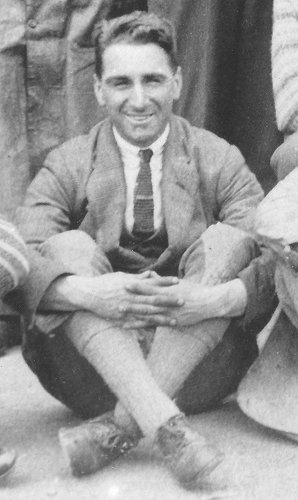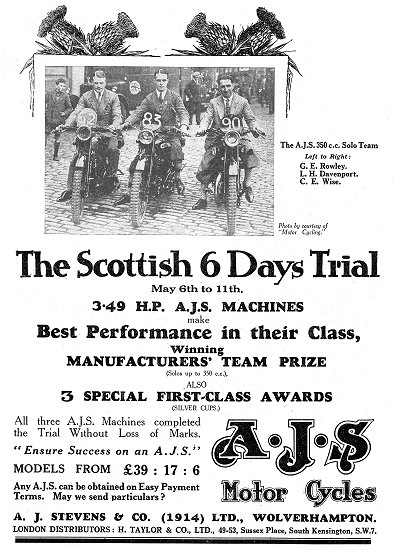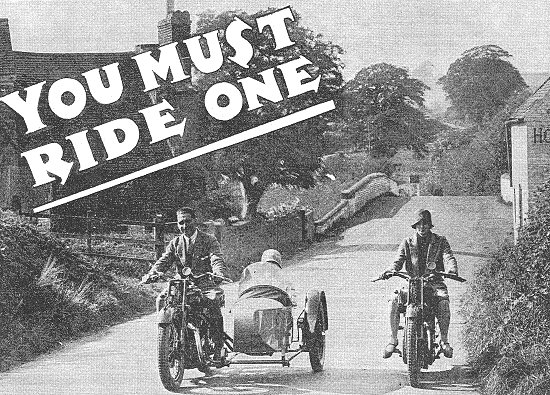Clarrie Wise
|
Clarrie Wise became famous in the
motorcycle world of the 1920s thanks to his numerous successes
on A.J.S. machines, in trials events both at home and abroad.
His photograph often appeared in the motorcycling magazines of
the day, frequently being seen in A.J.S. adverts, and in reports
of his trials successes. He would have been instantly recognised
by many readers of the popular magazines, as one of the ‘familiar faces’ of A.J.S. |
|

Clarrie in 1923. |
Clarence E. Wise, known to all as Clarrie, was born in
Tipton in 1896. After a few years his family moved to
Kidderminster, but by 1913 they had moved to
Wolverhampton. It was here that he started his motorcycling
career, in the testing department at Sunbeamland, the factory
where Sunbeam motorcycles were produced.
He worked on rough test, going out in all weathers to test
and run-in standard production machines, report any faults, and
in some cases rectify them. His foreman was the famous
competition rider Tommy de la Hay. Clarrie, who was keen to
get-on, approached works manager John Greenwood to ask for
promotion. Unfortunately there was nothing for him, so he got in contact
with Frank Giles, competition manager at A.J.S., and was offered
a job on final test.
At A.J.S. his career flourished. He became
a first-class tester, and successfully took part in many trials
events, soon becoming well-known in the motorcycle world.
His first important success was in the 1921 English Six Days
Trial, in which he won a gold medal. His fellow A.J.S. team
mates Frank Giles and George Rowley also won gold medals, but
Clarrie’s was the hardest to win because his machine was a prototype
overhead valve machine, which still had many teething troubles,
and problems which he had to overcome. |
|
Many successes followed, including the
following:
| 1922 |
International
Six Days Trial. Gold medal. |
| 1923 |
English Six
Days Trial. Gold medal. |
| 1924 |
A.C.U. Six
Days Standard Stock Machines Trial. Gold medal. |
| 1925 |
London -
Gloucester and Back Reliability Trial. First
class award, a silver cup. |
| 1926 |
International
Six Days Trial. Gold medal. |
| 1927 |
English Six
Days Trial. Gold medal. |
| 1928 |
Scottish Six
Days Trial. First class award, a gold medal. |
| 1929 |
Scottish Six
Days Trial. First class award, a silver cup. |
| 1929 |
International
Six Days Trial. Gold medal. |
| 1930 |
International
Six Days Trial. Gold medal. |
| 1930 |
Scottish Six
Days Trial. First class award, a silver cup. |
|
| Although he greatly enjoyed, and excelled in the events,
they could also be quite profitable. A win would result in a
bonus of around ten pounds from the factory, and
manufacturers of various accessories would reward him
financially. |
|

From Motor Cycling magazine, 15th May,
1929. |
Although only a reserve member of the
A.J.S. road racing team, he did carry out practice laps at
the Isle of Man T.T. and was asked to compete in the 1926
Junior and Senior races. In the Junior race he suffered from
engine troubles and had to retire early, but finished the
Senior in seventeenth place, after taking a tumble. Fellow
team mate Frank Longman finished in third place, and George
Rowley came in sixth.
Clarrie also became involved in
motorcycle football, a sport that became very popular for a
few years in the late 1920s. He was a founder member of the
A.J.S. team, and greatly enjoyed performing stunts on his
motorcycle at local public events.
There were several interesting projects
in which Clarrie was involved including testing the
prototype in-line four cylinder machine built in 1929, and
the prototype ‘S3’ with a 498cc. transverse V twin engine
which was launched in 1931. Clarrie disliked the in-line
machine, which he said was too heavy, unstable, and lacking
power from such a large engine. He was happier with the ‘S3’
but thought it could have been better. |

From a 1928 A.J.S. advert. On the left
is Clarrie riding the combination, with Millie Stevens on
the solo machine. |
|
Clarrie was a great friend of fellow A.J.S.
trials rider, and racing team member, Leo Davenport who shared
many successes with him.
In October 1931 A.J.S. went into voluntary
liquidation, and the factory at Graiseley Hill, Wolverhampton
closed. Clarrie found himself out of work, and got a job as a
demonstrator for the Anglo American Oil Company which sold
Pratts Motor Spirit. He travelled throughout the country
demonstrating the benefits of Pratts petrol over the
competition. The job only lasted until the sales campaign ended,
after which the demonstrators received a month’s notice.
Although the early 1930s were a time if
high unemployment, Clarrie soon got another job. In 1932 he
became a representative for the motor accessory firm, A.C.
Equipments, run by Albert Clarke, who had previously worked for
HRD. Clarrie stayed with the firm until he retired in 1965.
His retirement was spent at his
Wolverhampton home in Little Birches, off Birches Barn Road,
with his wife and daughter. He was a good watercolour artist,
and a loyal Wolves football fan, who had been the holder of a
season ticket since 1923. |
 |
Return to the
previous page |
|